| کد مقاله | کد نشریه | سال انتشار | مقاله انگلیسی | نسخه تمام متن |
|---|---|---|---|---|
| 10306278 | 547149 | 2012 | 12 صفحه PDF | دانلود رایگان |
عنوان انگلیسی مقاله ISI
Social stress interacts with diet history to promote emotional feeding in females
دانلود مقاله + سفارش ترجمه
دانلود مقاله ISI انگلیسی
رایگان برای ایرانیان
کلمات کلیدی
موضوعات مرتبط
علوم زیستی و بیوفناوری
بیوشیمی، ژنتیک و زیست شناسی مولکولی
علوم غدد
پیش نمایش صفحه اول مقاله

چکیده انگلیسی
Stress-induced eating disorders cause significant health problems and are often co-morbid with mood disorders. Emotional feeding, particularly in women, may be important for the development of obesity and failed attempts to lose weight. However, prospective studies assessing the effect of chronic psychosocial stress on appetite in different dietary environments in females are lacking. The present study tested the hypothesis that chronic psychosocial stress would increase consumption of high caloric diet and this emotional feeding would persist even when a healthier diet was available. Socially housed female rhesus monkeys were studied to address whether subordination increases caloric intake when a high fat and sugar diet (HFSD) was available concurrently with a low fat, high fiber diet (LCD). Cortisol responsivity and food intake were quantified during this choice phase and when only the LCD was available. The order of diet condition was counterbalanced to assess whether a history of HFSD would affect appetite. All females preferred the HFSD but subordinates consumed significantly more calories during the choice phase. The increased calorie intake was maintained in subordinate monkeys even after withdrawal of the HFSD. Subordinate females demonstrated reduced glucocorticoid negative feedback, with post dexamethasone serum cortisol levels significantly predicting intake of the HFSD but not the LCD during the choice condition. The cortisol response to an acute stressor significantly predicted subsequent intake of a HFSD in all females. Continual exposure to the psychosocial stress of subordination in female monkeys results in excess caloric intake of foods that mimic a western dietary environment. In addition, this social stressor interacts with a history of HFSD intake to promote increased feeding even in a healthy dietary environment.
ناشر
Database: Elsevier - ScienceDirect (ساینس دایرکت)
Journal: Psychoneuroendocrinology - Volume 37, Issue 9, September 2012, Pages 1479-1490
Journal: Psychoneuroendocrinology - Volume 37, Issue 9, September 2012, Pages 1479-1490
نویسندگان
Vasiliki Michopoulos, Donna Toufexis, Mark E. Wilson,